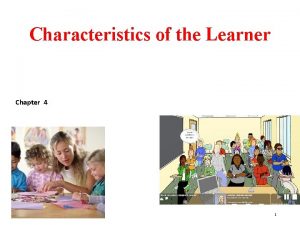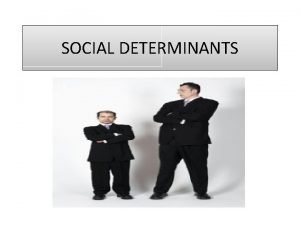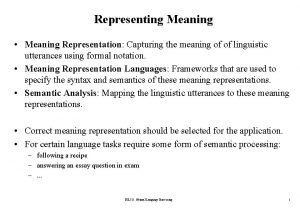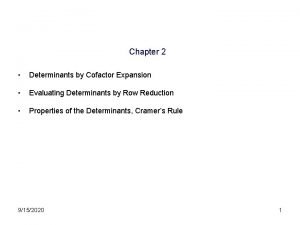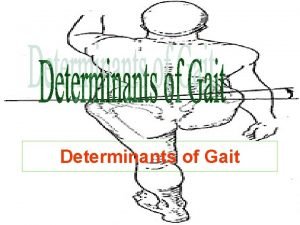SOCIAL DETERMINANTS Meaning of Social Group The Social
















- Slides: 16

SOCIAL DETERMINANTS

Meaning of Social Group • The Social Group excepts every person who belongs or want to belong to the group to confirm to its standards. • It judges him according to his ability to come up to these expectations, decides whether to except or reject him and if accepted, how much acceptance to grant him.

Meaning of Social Role • A Social Role is a pattern of customary behavior which has been defined by members of the social group & which is excepted of every member according to the position he holds in the group whether it be that of father, housewife, student, friend, leader etc. • Social Roles are learned by the person & are internalized so that, in time, they become self- expectations as well as social expectations. • A person whose behavior comes up to social expectations & who tries to play the social role prescribed for him by the group can be assured of reasonable approval and acceptance. Living up to group expectations increases the individual’s selfesteem

Social Determinants Social Mobility Early Social Experiences Group Status Social Deprivation Social Acceptance Prejudice & Discrimination

Types of Early Experiences • Home Experiences: - The home & the family provide the child’s for Social Environment & determine what his a first attitude towards people & Social activities will be. The home thus appears indeed to be a seat of learning for the development of social skills & perhaps of the desire to participate in activities with other individuals.

• Experiences outside the home: - Young children are more accustomed to social relationships with adults than with children, even if they have siblings & so they carry into outside situations the patterns of behavior they have found effective at home. They often ignore other children but try to win the attention of adults through glances, questions, comments etc.

Social Deprivation • Being deprived of opportunities for social contacts like being deprived of affection & love can play havoc with the personality pattern. • Social deprivation is the reduction or prevention of culturally normal interaction between an individual & the rest of society. • Social isolation is especially damaging to the personality in a culture which places high value on popularity. The damage comes in part from lack of opportunities to learn to participate in social activities & in part from the feelings of inadequacy which the deprived person feels in comparison with his age-mates.

SOCIAL ACCEPTANCE • How much influence the social group exerts over a person at any age is greatly affected by two persons: first, how acceptable he is to the group and, second, how important group acceptance is to him. • The more acceptable a person is to the group, the closer his relationship with group members & the more influence they exert over him. • The more value the person places on group acceptance, the more willing he is to be influenced by the group.

PREJUDICE AND DISCRIMINATION • Prejudice is a constellation of attitudes that cause, support or justifies discrimination. It is a form of pro- judgment in which anyone who is identified with a group against which there are unfavorable social attitudes is looked upon with disfavor and distrust & is regarded as inferior. • Discrimination involves acting categorically rather than individually. Discrimination following prejudice, differs from discrimination following preference in two major way. Discrimination following prejudice consists, first, of treating a person on some basis other than individual merit & , second, of treating the person in such a manner that one’s hostility is expressed in behavior that does physical or psychological harm to the person.

GROUP STATUS • In any social group, no matter what its size, status varies from member to member. Some are leaders while others are followers. Some are satisfied with the status they have while others are dissatisfied & wish to attain a status that is more to their liking. • Within a group, the interaction of the members becomes stabilized in a pattern consisting of a hierarchy of statuses & roles. Each status has its own experiences, responsibilities, & loyalties. The person is judged by the other members of the group in terms of how successfully he plays the role associated with his status.

STATUS OF LEADER • A leader is a member of a social group whom others are willing to follow because he has demonstrated his mastery in social relationships. In addition, he is able to elicit positive reactions toward himself from the group members because they recognize that he can contribute better than the other group members to satisfying the needs of the group as a whole.

MEANING OF SOCIAL GROUP • “Social Mobility” is the process of changing one’s status by movement within a social group or from one social group to another. Within a social group, a person’s status may change from fringer to involuntary isolate, from climber to leader, or from leader to follower. Or a person may move from one social group to another.

to MOBILITY KINDS OF SOCIAL • Effect of social mobility on personality: Social mobility in any form leaves its mark on the personality of the mobile person. The mark varies in severity & persistence according to the kind of mobility, but it is practically always distributing. • Effects of horizontal mobility: While horizontal mobility may mean a financial improvement for the family, an opportunity to bury the past, & a chance to gain a higher social status, it also means breaking old friendships & establishing new ones, adjusting to the mores & social life of a new group, & disrupting the schooling of children & adolescents.

• Effects of vertical mobility: Vertical mobility, whether upward or downward, is likewise psychologically damaging. It is a socially disruptive force, putting the person in a marginal position because he is torn from his social roots & has trouble establishing integrative social relationships.

• Upward mobility: Upward social mobility may satisfy a wrong drive for achievement. But its effects are often pleasant & its influences on the self concept may be highly detrimental. The timing of upward social mobility is a prime determinant of its effect on personality. When social mobility begins early in life, before a healthy personality pattern has developed, it can play havoc with self concept.

 Three determinants of learning
Three determinants of learning What are the 6 main social determinants of health?
What are the 6 main social determinants of health? Social determinants of personality
Social determinants of personality Social determinants of aggression
Social determinants of aggression Hình ảnh bộ gõ cơ thể búng tay
Hình ảnh bộ gõ cơ thể búng tay Bổ thể
Bổ thể Tỉ lệ cơ thể trẻ em
Tỉ lệ cơ thể trẻ em Voi kéo gỗ như thế nào
Voi kéo gỗ như thế nào Chụp phim tư thế worms-breton
Chụp phim tư thế worms-breton Alleluia hat len nguoi oi
Alleluia hat len nguoi oi Môn thể thao bắt đầu bằng từ chạy
Môn thể thao bắt đầu bằng từ chạy Thế nào là hệ số cao nhất
Thế nào là hệ số cao nhất Các châu lục và đại dương trên thế giới
Các châu lục và đại dương trên thế giới Công thức tính độ biến thiên đông lượng
Công thức tính độ biến thiên đông lượng Trời xanh đây là của chúng ta thể thơ
Trời xanh đây là của chúng ta thể thơ Mật thư anh em như thể tay chân
Mật thư anh em như thể tay chân
